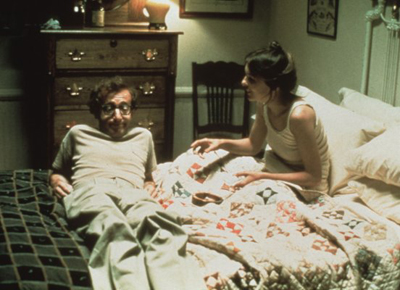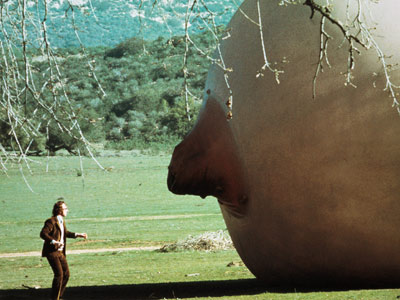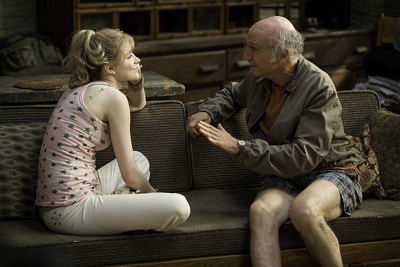I’ve always intended to catch up on Woody Allen’s work but I’ve never made the time. Since I knew that I would be travelling this week, I decided to dive into Allen’s filmography through the beauty of Netflix on demand. Though I’ve seen a number of his movies, I have never seen much of his early work or many of the films that made him a name. Now I have.
The Films
What’s Up, Tiger Lily? (1966) dir. Woody Allen
Zelig (1983) dir. Woody Allen
A Midsummer Night’s Sex Comedy (1982) dir. Woody Allen
Everything You Always Wanted to Know About Sex But Were Afraid to Ask (1972) dir. Woody Allen
Hannah and Her Sisters (1986) dir. Woody Allen
Whatever Works (2009) dir. Woody Allen
Annie Hall (1977) dir. Woody Allen
“Marriage is the death of hope.”
(A Midsummer Night’s Sex Comedy)
Allen’s protagonists are almost always cynical, and this quote about marriage nicely exemplifies the way that Allen approaches that cynicism with comedy. It’s no surprise to learn that Woody Allen began his career writing one-liners and then doing stand up comedy before he moved into film. His films are all full of these kinds of wickedly dour bon mots that usually work as a joke but then linger throughout a scene. Marriage, love, and fidelity are constant themes in these films. Almost no one gets married only once, and some characters are adamantly opposed to getting married at all. The rotating beds in Hannah and Her Sisters are a kind of refrain from A Midsummer Night’s Sex Comedy where groups of adults all fall for other partners that should be off-limits.
I get the feeling that being married in the Woody Allen universe is a lot like having an accountant, a summer home where you do your writing, or an apartment in New York City paid for with the earnings of chess lessons. None of it reflects the reality of the average Joe who doesn’t inhabit the Allenverse. Marriage in these movies isn’t an institution for a lifetime and love, as Boris in Whatever Works explains, “does not conquer all, nor does it even usually last.” Still, I think that Allen essentially has it wrong here. When his characters find each other and get married, they are full of hope and love. Even when things haven’t worked out, none of them ever stops trying. In my experience, and I think in these films, the thing that kills hope is not marriage, it’s divorce.
“How can you act when there’s nothing inside you to come out?”
(Hannah and Her Sisters)
I understand now why Annie Hall took home the Oscar in a year that gave the world Star Wars. Those two films released in the same year do a good job of reflecting my interest and struggle with contemporary movies. Annie Hall is about people, born from experience, and acted with sincerity and passion by people who understand the material. Star Wars is about adventure, born from imagination, and made incredible not by the actors but by the fantastic escape of it all. I like both films, but I’m glad that Annie Hall is such a great example of art coming out of experience. Acting, singing, writing, and film making all work best when they are the result of something coming out of an artist that can be absorbed by the audience.
In all of these films there are real artists doing work. The films don’t flash with outrageous techniques, but they do all work in ways that are particular to the medium. What’s Up, Tiger Lily? only works at all because the audience knows that the images flying by on the screen weren’t shot with the film’s dialog in mind. When characters break through the fourth wall as in Annie Hall and Whatever Works, the audience is reminded that these stories are being told in a very specific medium with specific rules. Though I didn’t find all of these films completely engaging, there wasn’t one of them that didn’t use the language of film to get something festering inside of Woody Allen out, and I appreciate seeing that process.
“Don’t worry, I know how to handle tits.”
(Everything You Always Wanted to Know About Sex But Were Afraid to Ask)
While sex is an omnipresent theme in all of these films, Allen’s approach to sensuality is awkward and anything but sexy. From the strange and persistent advances made by the lead in What’s Up, Tiger Lily? to the failed, forced attempts at lovemaking in A Midsummer Night’s Sex Comedy to the goofy courting and post-coital discussions in Annie Hall, sex is always present but it’s never titilating. Some of that comes from the characters that Allen (or his stand-ins like Larry David) plays. They are too obsessed, preoccupied, and dorky to ever appear virile but they are all somehow constantly talking about, searching for, or reacting to sex. And they are all having lots of sex. We see the build up, we see the aftermath, we hear the jokes about masturbation and performance, but we never see anything that really resembles sex. It’s a strange choice.
“On paper we were perfect. But life isn’t on paper.”
(Whatever Works)
The push and pull between passion and reason winds up being a thread through almost all of these movies. Allen establishes the set up where a wiser, older man is in a relationship with a younger, more naive woman who sees him as her intellectual and creative superior. In each case in these films, the woman is intimidated by her partner but ultimately grows either through the relationship or in spite of it and gets to a point where she needs to leave to keep moving. I’d love to see the tables turned and the roles reversed.
In relationships where the partners don’t fit that template, there’s still a struggle between characters’ intellectually satisfying connections and their baser urges for sex, exploration, and thrill-seeking. In Whatever Works, Boris explains that his marriage isn’t working because the reasons that he and his wife got together were too rational. Then again, nonsensical relationships don’t tend to work in these films either. It all seems to boil down to the notion that love is fleeting–that people change or never change but either way they can’t stay together.
“I feel that life is divided into the horrible and the miserable.”
(Annie Hall)
Through all of these films (with the exception of the first one which is admittedly experimental,) Allen’s cynicism drives the characters forward. It pushes and repels people into and out of Woody Allen’s screen-life. He is nothing if not consistent. But he’s also funny, at least most of the time, and that humor is what makes all of this darkness and bile seem somehow true. When a character is spouting out aphorisms, he’s usually talking out of his ass, even if what he says has some catchy face-validity to it. When characters leave a relationship, it’s usually because they really should, or they really should have avoided it in the first place. Even Zelig, the funniest and least sour of this batch of movies has a weight to it. It’s not just about Zelig as a curiosity, but about the things that drove Zelig to become the Chameleon Man. Whatever Works was a nice counterpoint to the earlier films this week because it seemed to provide an answer. It didn’t deny the horrible and the miserable, but it did offer a solution other than an endless cycle of self-loathing and obsession. It featured all of the tropes–a May/December romance, an eccentric but brilliant New Yorker, relationships that run their course before the movie is over, hypochondria, and references to the movies–but it didn’t end with a shrug.
As a survey, this week provided some highlights. I am not going to jump into Woody Allen Week 2 any time soon, but I’m glad to now have this grounding.
Other Movie Weeks in 2011:
Secret Agent Week
Asian Action Week



